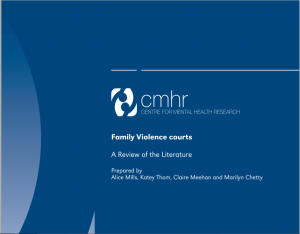
Centre for Mental Health Research, University of Auckland, 2013
This report begins with the grizzly fact that, “58% of all reported violent crime between 2010 and 2011 were the result of family violence,” setting the scene for the need for specialist family violence courts.
They outline the four key models of domestic violence courts, as described in literature (Center for Court Innovation, 2007):
1. Multi-jurisdictional domestic violence courts are overseen by one judge that handles criminal cases and overlapping family law and divorce cases.
2. Criminal domestic violence courts handle criminal cases with an adult defendant and an adult victim involved in an intimate relationship.
3. Civil/family domestic violence courts cover cases where a victim file a restraining/protection order against a defendant who is a current or former intimate partner, as well other cases involving the victim and the defendant.
4. Juvenile domestic violence courts consider cases where the defendant is a juvenile. P6
Carried out with support and funding from The New Zealand Law Foundation, this report reviews the existing literature around family violence courts from New Zealand, Australia, Canada, the United Kingdom and the United States. It begins with the development of the courts, discusses existing evaluations – providing a thematic analysis of the evaluation literature and concludes with the need for further research.
They highlight areas of weakness in existing evaluation, including: a lack of rigorous research, research design issues, insufficient involvement of all stakeholders, absence of the analysis of cultural competency in staff and the difficulty of ascertaining the effectiveness of the family violence courts in protecting victims.
A table summarising key findings from studies can be found on pp. 23-31.
Find the full report here
